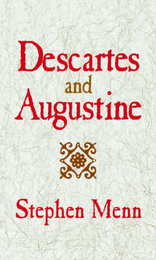
|
Descartes and Augustine
Paperback / softback
Main Details
| Title |
Descartes and Augustine
|
| Authors and Contributors |
By (author) Stephen Menn
|
| Physical Properties |
| Format:Paperback / softback | | Pages:434 | | Dimensions(mm): Height 228,Width 153 |
|
| Category/Genre | Western philosophy - Medieval and Renaissance c 500 to c 1600
Western philosophy - c 1600 to c 1900 |
|---|
| ISBN/Barcode |
9780521012843
|
| Classifications | Dewey:194 |
|---|
| Audience | | Professional & Vocational | |
|---|
| Illustrations |
Worked examples or Exercises
|
|
Publishing Details |
| Publisher |
Cambridge University Press
|
| Imprint |
Cambridge University Press
|
| Publication Date |
28 January 2002 |
| Publication Country |
United Kingdom
|
Description
This book is the first systematic study of Descartes' relation to Augustine. It offers a complete reevaluation of Descartes' thought and as such will be of major importance to all historians of medieval, neo-Platonic, or early modern philosophy. Stephen Menn demonstrates that Descartes uses Augustine's central ideas as a point of departure for a critique of medieval Aristotelian physics, which he replaces with a new, mechanistic anti-Aristotelian physics. Special features of the book include a reading of the Meditations, a comprehensive historical and philosophical introduction to Augustine's thought, a detailed account of Plotinus, and a contextualization of Descartes' mature philosophical project which explores both the framework within which it evolved and the early writings, to show how the collapse of the early project drove Descartes to the writings of Augustine.
Reviews' ... the best book in the English language on the Meditations ... Historical scholarship does not get any better.' David Glidden, Ancient Philosophy ' ... a brilliant piece of research in the history of philosophy which will surely be a work to be read and reckoned with by future students of Descartes and Augustine.' The Modern Schoolman ' ... a fresh and excitingly bold reading of Descartes ... Stephen Menn's wonderful book makes Augustine's Fourth Century much less remote from Descartes's seventeenth century than we had thought it was.' Philosophy in Review
|